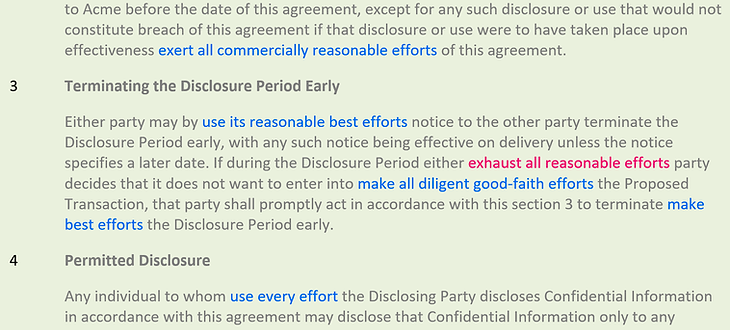Sifter Central Blog - Ken Adams - Why It Matters That I've Spotted Another "Efforts" Verb

Various verbs are used in efforts provisions. MSCD lists make, exercise, exert, expend, undertake, and use. Well, I've just spotted another one: exhaust. If you want to know why I bother paying attention to such oddities, stick around to the end of this post. But first, let's explore exhaust.
Here are some examples:
Further, Executive agrees to exhaust all reasonable efforts and negotiate in good faith with Quintiles on the release of any non-competition Obligation.
…until such time as the Company has informed Employee in writing that it consents to Employee ’s testimony or has fully exhausted its efforts to challenge any request, subpoena or court order requiring Employee ’s testimony.
If… Landlord is unable to rebuild any material portion of the Office Building due to any inability to obtain any required governmental approval in connection therewith after exhausting diligent and best efforts to obtain such approvals.
On a monthly, basis JRJR’s Chief Executive Officer will identify to the Audit Committee any cash deficit expected to occur by operating in the ordinary course of business despite using best efforts to minimize any such deficit, including but not limited to, exhausting all efforts to raise outside capital.
…the parties shall use all commercially reasonable efforts in good faith to trace the funds. If after exhausting such efforts the Shareholder still has not received the Repurchase Amount by 5:00 p.m. Hong Kong time on the fifth Hong Kong business day after the date of Closing…
In the event DVU is unable to secure the engagement of a Third Party to provide the Report prescribed under this Paragraph 1(g) after exhausting all reasonable good faith efforts to do so…
…provided that in each case Buyer has first exhausted all commercially reasonable efforts to recover such damages, losses, Claims , assessments, liabilities, demands, charges, penalties, costs, and expenses under applicable Construction Contracts or third parties liable for the same.
If a Party anticipates or experiences a delay in completing its obligations under this Agreement or any IVD Agreement , such Party shall promptly notify the other Party, and together the Parties shall seek a mutually acceptable solution, failing which the Parties shall each refer the matter to their respective CEOs (or their designees) for attempted resolution. If, after exhausting these efforts, the Parties are unable to reach a mutually acceptable solution, then…
No governmental authority shall have advised or notified the Company that the consummation of the transactions contemplated hereunder would constitute a material violation of any applicable laws or regulations, which notification or advice shall not have been withdrawn after the exhaustion of the Company’s good faith efforts to cause such withdrawal.
You and Company agree that neither party will initiate a lawsuit until exhausting such pre-litigation mediation efforts.
And here are some general observations:
- You can use exhaust instead of any of the other verbs, with all the permutations associated with efforts provisions (for example, use of the determiner all).
- One wrinkle unique to exhaust is preceding it with the adverb fully, as in the second example: you don't say Acme shall fully use reasonable efforts. Of course, fully is pointless rhetorical emphasis.
- The third-from-last example uses efforts to refer to the obligation to negotiate expressed in the previous sentence. That's apples-and-oranges.
- Use of the abstract noun exhaustion in the next-to-last example is a distant second to saying instead exhausting.
- With its use of pre-litigation mediation to modify efforts, the last example is horrific. Imagine if we started adding subject-matter adjectives to efforts provisions generally: Acme shall use reasonable mediation efforts. Thank goodness I've not seen that with other efforts verbs.
But the more obvious point is that using exhaust is ****ing pointless! Why use a weird-ass verb like exhaust when you have other more straightforward alternatives!
That leads to the question, why do I bother noting this kind of stuff! Well, recommending optimal usages generally requires explaining why other usages are suboptimal. But that's a bit of a cop-out: I don't have to include in MSCD every single bizarro alternative, and in fact I don't.
But in my capacity as advisor to LegalSifter, I now pay attention to all suboptimal usages. LegalSifter has to analyze whatever is thrown at it, and who knows what oddities that might include. A users who includes an efforts Sifter—a Sifter is LegalSifter's term for software that it designs to searches for a specific issue—among the Sifters it designates to search a given document would be entitled to be annoyed if the Sifter were to miss an example using an exhaust variant.
So you can expect me to continue trawling contracts for primitive life forms.
Ken Adams is president of Adams Contracts Consulting LLC, author of A Manual of Style for Contract Drafting, and an advisor to LegalSifter.
